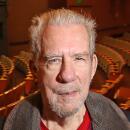THEATER REVIEW: A meandering ‘Lost Highway’
- Share via
Some show business luminaries “” James Dean, Buddy Holly, Janis Joplin “” never lived to celebrate their 30th birthdays, but found themselves venerated even more after death than they were in life.
Country singer Hank Williams (1923-1953) is a charter member of this select society. Dead at 29 after ingesting enough booze and drugs to bring down a charging rhino, he has become legendary among his admirers. Now his story is being told at the Laguna Playhouse in “Hank Williams: Lost Highway.”
Written by Randal Myler and Mark Harelik, and directed by Myler, “Lost Highway” suffers by comparison to most showbiz stage bios in that its subject is not fully fleshed out until late in the second act, and then strictly in a negative sense. The magnetism that entranced fans in the 1940s and early ‘50s “” and drew some 25,000 of them to his funeral “” is never really evident in the Laguna production.
The show’s first act “” establishing Williams and his yodel-singing as a presence in the genre that was accurately known, in those days, as “hillbilly music” “” consists of 90% musical performance and 10% plot advancement.
This segment is highlighted not by Van Zeiler, who plays Williams, but by Margaret Bowman as his tough old biddy of a mother and the matriarchal boss lady of his early band. Zeiler, whose singing voice richly resembles his character’s, gets his scenery-chewing scenes near the end of the show as his drinking and boorish behavior spell the end of both his combo and his marriage. The highlight of this segment comes when he takes a star-struck waitress (Stephanie Cozart) out for a wild one-night stand.
As the blond cutie who marries Williams, and then tries to push her talentless singing voice up to the microphone, Regan Southard is, along with Bowman, the best element of the show. A natural actress of multiple dimensions, Southard conveys volumes with her facial expressions alone, not to mention her intentionally awful vocalizing.
The backup trio Stephen G. Anthony, Myk Watford and Mark Baczynski are formidable musicians, but their lone “comedy” skit without Williams makes “Hee Haw” look like “Masterpiece Theater.” It’s a telling comment on what passed for entertainment on the whistle stops in the 1940s.
Returning Williams, in spirit anyway, to his backwoods roots is an aging, immaculately dressed, black, street singer played by Mississippi Charles Bevel, whose vocalizing is impressive but whose role in plot advancement is questionable. Mike Regan is alternately stern and paternal as the band’s business manager.
Vicki M. Smith’s countrified set design is marvelously atmospheric, and some of the ads on the backdrop curtains at the Grand Ole Opry are a howl. Music director Dan Wheetman keeps the tempo brisk, and Robert Blackman’s period costumes are appreciable.
“Hank Williams: Lost Highway” may appeal to fans of the country/western music genre, but general audiences may find this piece of musical barbecue tough to swallow.
All the latest on Orange County from Orange County.
Get our free TimesOC newsletter.
You may occasionally receive promotional content from the Daily Pilot.








